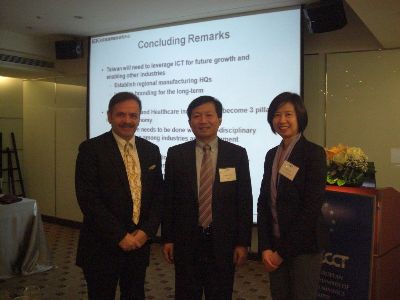Opportunities and challenges for ICT industries in Taiwan

On 12 December, the ECCT's Technology committee hosted a lunch on the topic "Opportunities and challenges for ICT industries in Taiwan" with guest speaker Stephen Su, General Director, Industrial Economics and Knowledge (IEK) Center, Industrial Technology Research Institute (ITRI). In his presentation, Su highlighted some key trends in Taiwan's ICT development and related clusters of industrial value chains, including manufacturing and services. He also talked about future opportunities and challenges faced by Taiwan's ICT industries in the post-ECFA period with China.
• Taiwan's GDP has risen ten-fold in just 30 years. For the past twenty of those years, Taiwan's Information and Communications Technology (ICT) industry has played a key role in the global supply chain for electronics products.
• Today, Taiwan has significant global market shares in several ICT sectors including notebook PCs, desktop PCs, servers and other electronic devices.
• Today, Taiwan has significant global market shares in several ICT sectors including notebook PCs, desktop PCs, servers and other electronic devices.
• The close proximity of companies in Taiwan (most within an hour and half's driving distance) has led to the formation of industrial clusters that offer distinct advantages, making Taiwan an excellent one-stop shop for procurement, design support and rapid commercialization of product ideas.
• Taiwan's unique public private partnership (PPP) model for collaborative research and commercialization of key technologies has played a major part in some of Taiwan's high-tech success stories.
• A case in point is ITRI, the largest research institute under the supervision of the Ministry of Economic Affairs (MoEA). ITRI focuses on technology commercialization between universities and industries.
• In addition, Taiwan's OEM/ODM companies have helped the industry to develop strong manufacturing competence in the market.
• Nevertheless, the growth of Taiwan's ICT industries has been very dependent on sustained demand from major customers based in the US, Europe and other developed countries.
• To sustain growth, new areas need to be explored. Besides ICT, there is also great potential for growth in the emerging service-based application ecosystems enabled by ICT for the healthcare (especially medical devices) and machinery industries.
• There also needs to be a greater focus on innovation.
• Taiwan has many advantages that position it well to move up the value chain: already existing integrated industrial value chains and clusters, global manufacturing networks and footprints, flexible market responsive capability, excellent cost control capability, fairly good IP protection, an accommodating culture and strong investment and business ties to mainland China.
• Taipei also has the ability to compete with cities in China as a regional headquarters hub.
• However, there are some key challenges facing Taiwan's ICT industries. Many industry segments are in decline, such as display and memory, while others such as notebook computers are losing market share to tablets. Transforming to higher value-added manufacturing and branding is easier said than done. The current focus on being the cheapest needs to shift to being the most innovative. In addition, more cross-collaboration between the ICT and other industries is needed, in particular service industries. Manufacturing must become more service oriented and traditional industry must work to become more unique, according to Su. Local firms will also need to foster an environment to retain and attract domestic and foreign talent. This will mean higher salaries, better benefits and working conditions.
• Su concluded his presentation by saying that help is needed from international firms as the right partners have the skills and experience to help overcome many of these challenges.
• A case in point is ITRI, the largest research institute under the supervision of the Ministry of Economic Affairs (MoEA). ITRI focuses on technology commercialization between universities and industries.
• In addition, Taiwan's OEM/ODM companies have helped the industry to develop strong manufacturing competence in the market.
• Nevertheless, the growth of Taiwan's ICT industries has been very dependent on sustained demand from major customers based in the US, Europe and other developed countries.
• To sustain growth, new areas need to be explored. Besides ICT, there is also great potential for growth in the emerging service-based application ecosystems enabled by ICT for the healthcare (especially medical devices) and machinery industries.
• There also needs to be a greater focus on innovation.
• Taiwan has many advantages that position it well to move up the value chain: already existing integrated industrial value chains and clusters, global manufacturing networks and footprints, flexible market responsive capability, excellent cost control capability, fairly good IP protection, an accommodating culture and strong investment and business ties to mainland China.
• Taipei also has the ability to compete with cities in China as a regional headquarters hub.
• However, there are some key challenges facing Taiwan's ICT industries. Many industry segments are in decline, such as display and memory, while others such as notebook computers are losing market share to tablets. Transforming to higher value-added manufacturing and branding is easier said than done. The current focus on being the cheapest needs to shift to being the most innovative. In addition, more cross-collaboration between the ICT and other industries is needed, in particular service industries. Manufacturing must become more service oriented and traditional industry must work to become more unique, according to Su. Local firms will also need to foster an environment to retain and attract domestic and foreign talent. This will mean higher salaries, better benefits and working conditions.
• Su concluded his presentation by saying that help is needed from international firms as the right partners have the skills and experience to help overcome many of these challenges.
